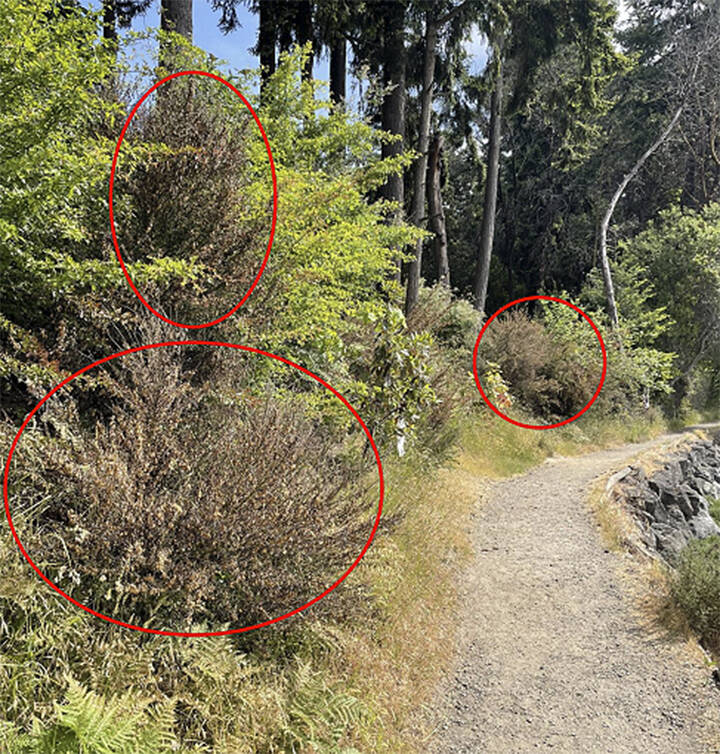Six items are on the agenda for the Bainbridge Island City Council work session March 19 at 6 p.m. at City Hall and on Zoom.
Puget Sound Energy will give a presentation. For BI specifically, it is working on problems like poor transmission, reliability, aging infrastructure and dependable power for businesses and residents, it’s powerpoint presentation says. Its solution is a new grid infrastructure and energy efficiency to ensure safe, dependable power.
It is rebuilding the aging Winslow Tap, putting in a new transmission line, improving substations and targeting conservation to reduce demand. A second transformer at the Murden Cove Substation will be installed. All the improvements are being done to meet customer energy needs and improve reliability and resiliency. The work is set to be done in 2028. PSE aspires to be a beyond net zero carbon energy company by 2045, consistent with city goals. BI wants to increase electric vehicle charging stations, change to an EV fleet and prohibit other fuels for primary heating in new buildings.
It mentions the Washington State Ferries electrification planning of 16 terminals, converting six vessels and building 16 new vessels. The plan for BI is vessels electrified in 2024-25 for 20% fuel savings; and terminal electrification in 2027 for 95% fuel savings.
Affordable housing
The council will discuss providing financial support for affordable housing projects sponsored by non-governmental entities. It has helped in the past, but not in a systematic or predictable way, a city memo says. For example, a project in 2007 received $9,000 while one in 2022 received $2 million. Lack of funds, lack of information and lack of a comprehensive plan have also been issues.
The city now can help, thanks to a law passed in 2022 increasing the sales tax within BI 1/20th of 1% for affordable housing. That could bring in $850,000 a year. Also, in 2023, a council resolution provides some building and planning fees to help subsidize affordable housing projects. That would bring in $17,000 to $100,000 a year.
The city is also using its own property for an affordable housing project. So it is formulating a plan, similar to the Capital Improvements Plan, where applications would be taken for funding.
It will also review and discuss affordable housing revenue sources. One possibility to increase those funds would be to use money from the hotel-motel tax. There are requirements, such as it needs to be built within a half mile of a transit station. Previously, the tax money has been used mostly to increase tourism. But in 2015 it became law that bonds could be paid for housing for an affordable workforce in certain conditions. There are other restrictions, too.
Comp, Winslow plans
The council will discuss the draft 14-page Comprehensive and nine-page Winslow Subarea plans.
In Winslow, there are three options: do nothing, build up having walkable corridors or build out middle housing expansion. Each alternative looks at mobility and open space.
Regarding the Comp Plan, city documents say the update consultant team conducted interviews with members of the BI community, intended to provide an introduction to the topics and issues on the community’s collective mind and to shape the project’s approach to optimize community engagement.
Key topics include: Active senior community; need for senior housing due to downsizing; political divide rather than seeing commonalities; local workforce housing needs; mobility diversity needs; more healthcare needed; more racial diversity needed; need for rural and nature; ferry traffic and roundabout concerns; tourism economic impacts; rising sea level; reduced housing footprint; declining school enrollment; anti-development attitudes; lack of BI nightlife; city staff culture of fear to disagree; lack of collaboration with other Kitsap County towns; wealth shaming; bias of housing types; climate change and community engagement.
EV charging
Electric vehicle charging infrastructure is now required by the state in construction projects. BI code exceeds the state standard when it comes to commercial and multifamily construction. For example, the state code is only for new buildings, while the city’s is also for building expansion. The city plans to take another look at its code.
Pesticide use
The city will look at its use of herbicides and pesticides. Since 2003 it has used items from the Least Toxic Products list. However, in 2022 Kitsap County terminated its Noxious Weed Program, leaving BI without a means to prevent, control and eradicate such weeds. In 2023 the Cooperative Weed Management Area and the city worked together on the noxious weed problem at Lost Valley and Waterfront Park.



